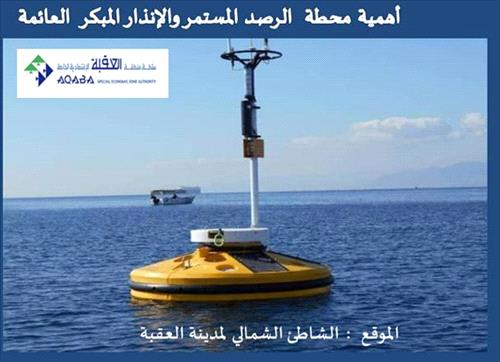Ammon News - AMMONNEWS - A new seawater quality monitoring station in the southern part of the Gulf of Aqaba is now disseminating constant data to specialists on sea temperature, salinity and oxygen levels as well as any polluting agents, a conservationist said on Saturday.
Installed off the 7-kilometre coast of the Aqaba Marine Park (AMP), the data of the station will also be broadcast soon on a screen at the AMP's visitor centre to provide tourists with up-to-date information and indicators on the ecology of Aqaba's seawater, according to Abdullah Abu Awali, consultant of the Coastal Management and Protection Unit at the Aqaba Special Economic Zone Authority.
The station also sends data on the concentration of oil and toxic chemicals such as chlorophyll, ammonia, nitrate and phosphate among other elements, in addition to sunlight radiation levels and radiation levels in the air and seawater, sea turbidity, waves and currents and wind speed, according to the AMP.
The park is located 15 kilometres from downtown Aqaba. The government declared it as a nature reserve in 1997 with the aim of protecting the marine environment from rising pollution resulting from the rapid growth of Aqaba’s population and expansion in its industrial activities, according to AMP website.
While the new seawater quality monitoring station, installed in 2016 and is now fully operational, does not substitute monitoring programmes of the seawater, it provides quick readings that alert specialists and authorities on any changes in the Gulf of Aqaba marine ecosystem.
"The station provides us with reliable and around-the-clock data on all of the sea and air elements and serves as an early detection and warning system," Abu Awali told The Jordan Times, noting that it saves time, effort and money.
The new seawater quality monitoring station is the second of its kind to be installed in the Gulf of Aqaba's water, according to the conservationist, who said that a similar station was installed a few years ago in the northern part of the Gulf of Aqaba nearby the hotels area.
The data of the first station are sent to a laboratory in downtown Aqaba, where a screen also transmits the data continuously, he said.
Indicating that because Jordan has a zero discharge policy of any liquids or wastewater into the Gulf of Aqaba waters, the quality of its seawater is "excellent", Abu Awali said, noting that the two stations did not send signs of pollution since their installation.
The Gulf of Aqaba is a semi-enclosed water basin attached to the semi-enclosed Red Sea, with a length of 170km, an average width of about 15km and a maximum depth of more than 1,800 metres, according to the Royal Marine Conservation Society.
Its water is warm year round, with the average sea temperature standing at 24°C, according to the society, which indicated that Jordan’s 27km coastline represents the northernmost outcropping of coral reef in the world and tolerates a high salinity rate compared to other seas.
*JT
